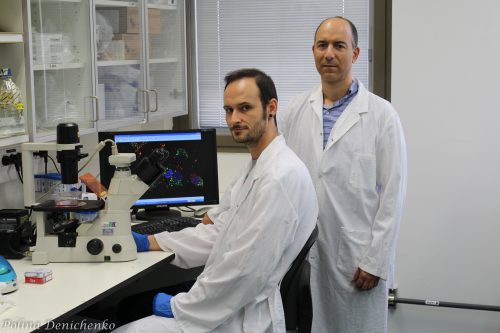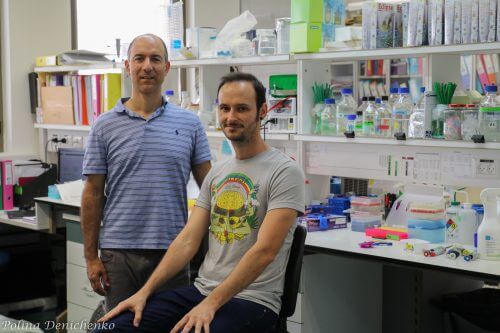New and groundbreaking research at the Hebrew University may lead to effective treatment of one of the most difficult types of cancer, which accounts for 17 percent of all brain tumors. Prof. Rotem Karni, one of the leaders of the study: "This is a study that brings with it a new and targeted way to treat glioblastoma." The finding was approved and registered as a world patent
Research conducted by PhD student Maxim Mogilevsky from the research team of Prof. Rotem Karni from the Medical Research Institute at the Faculty of Medicine of the Hebrew University, reveals the development of innovative molecules that inhibit the creation of a protein that is important for the development of violent brain cancer of the glioblastoma type.
Glioblastoma is an extremely violent cancer, which accounts for 17 percent of all brain tumors and as of today there is no treatment for it. This cancer originates from glial cells, supporting cells for neurons, which at a certain point stop differentiating and start multiplying uncontrollably. The life expectancy of patients with this type of cancer is about 27 months in the less aggressive type and only about 11 months in the more aggressive type.

One of the well-known problems in the treatment of cancer, including glioblastoma, is the development of resistance to the chemotherapy used as a treatment against them. The poor prognosis of patients with this type of cancer is what led the researchers to try to find an effective way of treatment in order to improve the quality and length of life of the patients.
Hebrew University researchers have now succeeded in finding that a certain shield, known as MKNK2, creates two different proteins in a process called alternative RNA splicing. The proteins that are formed have an opposite effect: Mnk2b, which functions as a cancer-causing gene, and Mnk2a, which functions as a cancer-inhibiting gene (tumor suppressor). Previous work in Prof. Rotem Karni's laboratory showed that Mnk2a is able to activate a stress pathway in cells that leads to a decrease in the rate of cell division and their programmed cell death.
The researchers succeeded in developing an innovative molecule that blocks the alternative splicing process of Mnk2b in cancer cells. This blockade lowers the production of the cancer protein MNK2b and increases the levels of the cancer-inhibiting protein MNK2a, which results in tumor cells that are resistant to chemotherapy becoming sensitive to treatment and increasing death their. "We also see that a combination of treatment with the molecule together with chemotherapy leads to a much more significant killing of the cancer cells than treatment alone", explains Prof. Carney.

The disturbing Findings of Research were published in the journal Nucleic Acids Research. The find was approved as a patent and is in the process of global commercialization by the company "Applicationof the Hebrew University.
"This is research that brings with it a new and goal-oriented way to treat glioblastoma, a violent cancer for which there is no cure, and other types of cancer in which Mnk2a levels are low. In the future, I believe that we will be able to direct the treatment to cancerous tumors in which the test shows a low Mnk2a level in a personalized way", states Prof. Karni. The research was supported by the Germany-Israel Joint Fund (GIF), and by the Israel Innovation Authority.

2 תגובות
For every disease a medicine: health problems, dealing with a disease, dealing with pain, mind-body relationship, cancer treatment, dealing with cancer, medicine for every disease, dealing with cancer, dealing with a health problem, dealing with pain...
Well done !